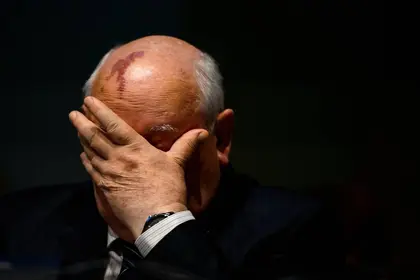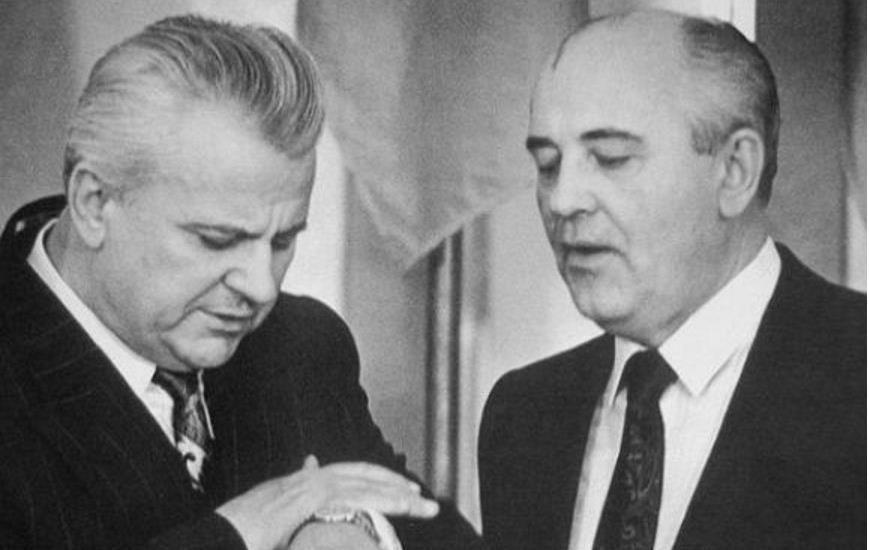Mikhail Gorbachev, the last leader of the Soviet Union who, in seeking to preserve it, inadvertently destroyed it, has died aged 91.
The world’s press and many international dignitaries are paying tribute to him as a major political figure who helped reduce international tensions and whose relaxation of political controls at home precipitated the end of Soviet totalitarianism and Moscow’s domination over eastern Europe.
JOIN US ON TELEGRAM
Follow our coverage of the war on the @Kyivpost_official.
All this is true and, in this regard, he certainly carved out his place in history.
But Gorbachev was a far more complex and controversial figure than is generally assumed. Not quite the benevolent and purposeful master in his supposed democratic drive, but more a somewhat clumsy captain seeking to keep his cumbersome vessel afloat through the powerful currents of historic change. He did so with mixed results.
Perhaps paradoxically, Gorbachev was formed out of the very forces he released and which took hold of him, rather than a genuine architect of change. As such, he became trapped in the struggle between the dynamics representing the old and the new.
Let’s take a more sober and nuanced perspective of his place in the grander scheme of things,relying on a few correctives to help set the record straight. They are limited to Gorbachev’s attitude towards Ukraine and the preservation of the Soviet empire, which is revealing enough.
Saving the failing Soviet system
Initially, Gorbachev’s selection as general secretary of the Communist party of the Soviet Union in March 1985 did not seem to have much significance for Ukraine. What was of primary interest internally and to the outside world was whether, at 54, this relatively young Soviet leader from the rural Stavropol region represented a break with his septuagenarian predecessors, Leonid Brezhnev, Yuri Andropov and Konstantin Chernenko, in more than just physical appearance and energy.
The first signs did not encourage optimism. Initially, Gorbachev was even claiming that Stalinism was a concept invented by the West to discredit the Soviet Union.
During his visit to Kyiv in June of that year, Gorbachev was shown on television failing to distinguish between Russia and the Soviet Union. He also retained the communist hardliner and promoter of Russification, Volodymyr Shcherbytsky, as Moscow’s proxy in Ukraine.
However, the new Soviet leader was immediately forced to grapple with distressing realities – the Soviet system was increasingly floundering economically and not able to compete with the West. The need for economic restructuring (“perestroika”) and modernization was urgent, and its implementation called for a degree of openness (“glasnost”).
Gorbachev therefore began warily tinkering with the system, not with the aim of dismantling it, but revamping it.
Even the modest relaxation of controls was enough to let the genie out of the totalitarian Soviet canister and set processes in motion that he had not envisaged and which he rapidly begin to lose control over.
Turning points
The explosion at the Chornobyl nuclear power plant near Kyiv in the early hours of April 26,1986, proved a watershed moment. The world’s worst nuclear accident – and the attempt by Gorbachev and his regime to cover it up – not only illuminated the extent of Soviet bureaucratic indifference and the hollowness of the proclaimed “glasnost,” but demonstrated how little say Ukraine, formerly a Soviet Socialist Republic, had in matters affecting its own well-being and its own future in the centralized Russian-dominated Soviet empire.
The catastrophe was a huge embarrassment at home and abroad, forcing Gorbachev to move further in the direction of controlled “democratization.” Political prisoners were released, and in 1988 multi-candidate elections took place.
Gorbachev now faced opposition from hardliners within the Communist Party, liberals, democrats and campaigners for the rights of the non-Russian nominally Soviet states. In 1989, their diverse representatives elected to the USSR Congress of People’s Deputies coalesced in the Inter-regional Deputies Group – a proto-legal parliamentary opposition. Russian human rights campaigner Andrei Sakharov and Russian former Communist official Boris Yeltsin were among its leaders. This genuine reformist, and in the circumstance veritable revolutionary, alliance kept up the pressure on Gorbachev to end the system of Communist one-party rule, which he resisted.
Public life was revitalized by the return of political prisoners and by the appearance of independent clubs and associations. In the Baltic Republics and elsewhere, mass movements for democratization and national-self-determination, known as Popular Fronts or Movements, appeared and pressed for the restoration of the rights, and subsequently, independence of the non-Russian nominally sovereign Soviet states.
Gorbachev failed to grasp that democratization and the preservation of Moscow’s empire in the broader and narrower senses were incompatible. The Berlin Wall came down in September 1989 and eastern Europe finally thew off its Soviet yoke. Gorbachev was hailed as peace-maker and awarded the Nobel Peace Price for not intervening militarily – but in reality, here too, he was reduced to the role of a concerned observer putting on a brave face, rather than a director of the process.
Moscow’s response at home was not so tolerant or peaceful. Lithuania’s current Defense Minister Arvydas Anushauskas, for instance, responded to Gorbachev’s death by accusing the last leader of the Soviet Union of being a criminal. He recalled that between April 1989 and January 1991 Gorbachev had ordered the brutal suppression of peaceful protests in Tbilisi, Baku and Vilnius.
In Ukraine, Gorbachev kept Shcherbytsky in place until as late as September 1989, when it became clear that with the emergence of the mass Ukrainian Popular Movement for Restructuring – Rukh, Moscow’s control was weakening and communists were joining it, or embracing its ideas.
Gorbachev, nevertheless, was determined to preserve the Soviet Union and began proposing the idea of a new Union treaty to placate the republics. But he was badly out of step with reality. In June 1990, even the Russian Federation under the leadership of Yeltsin proclaimed its sovereignty. Ukraine was quick to follow and did so the following month.
By now, Gorbachev had met his matches – in Russia, in Yeltsin; in Ukraine, in Leonid Kravchuk, a top communist ideologist who on being elected Speaker of the then still Soviet Ukrainian “parliament,” championed the republic’s sovereignty. It was Kravchuk more than anyone else who craftily foiled Gorbachev’s efforts to impose a new Union treaty.
Despite all this, Gorbachev stubbornly continued pulling in the wrong direction, while Yeltsin and Kravchuk promoted strategies responding to the historical circumstances and the popular mood.
But even Western leaders such as British Prime Minister Margaret Thatcher and U.S. President George Bush misread the situation and threw their support behind the lame duck Communist Party leader who, in order to buttress his position, had himself elected in June 1990 as President of the Soviet Union in the first and last Soviet presidential election.
Political implosion
In August 1991, when Soviet hardliners botched their attempted coup in Moscow, it became even clearer that Gorbachev was a spent force. Yeltsin reaffirmed himself as the chief political force in Russia, while Ukraine (where Kravchuk’s evolving leadership was a significant factor) and other republics declared their independence.
Gorbachev realized that Ukraine’s affirmation of its self-determination was a critical game changer.
“There can be no Union without Ukraine, I feel, and no Ukraine without the Union. These Slavic states, Russia and Ukraine, were the axis along which, for centuries, events turned and a huge multinational state [NB He did not refer to it as an empire] developed. This is the way it will remain. I am convinced of it,” the Ukrainian press reported him as saying on August 30, 1991.
All that Gorbachev could do was to fume and to warn that if Ukraine left the Union it would split along ethnic lines.
Finally, in December 1991, the demise of the Soviet Union and the personal humiliating failure and irrelevance of “President” Mikhail Gorbachev were underscored by his very absence at the meeting in Belarus of Yeltsin, Kravchuk and Belarusian leader Stanislav Shushkevich at which they decided to declare the USSR defunct.
Bitter loser and convoluted imperialist nostalgia
But the story does not end there.
Gorbachev never regained popularity and respect at home. When he ran for president in 1996, he received around one percent of the vote.
Later, he totally miscalculated again and welcomed the unexpected and dubious rise to power of Vladimir Putin, simultaneously lambasting the West, and especially the US, for what he called its “triumphalism.” While claiming to still want democracy for Russia, Gorbachev’s criticism of Putin’s authoritarian methods and aggression remained muted.
Having lamented the dissolution of the Soviet Union during his subsequent years of effective marginalization from political life in Russia, and while remaining a popular figure in the West, Gorbachev supported Russia’s annexation of Crimea in 2014. As a result, in May 2016 Ukraine banned him from entry into the country for the next five years.
In December of 2016, with Putin’s Russia waging a war against Ukraine in the Donbas, the former Soviet leader still maintained publicly that a “union” with the same borders as the USSR could be restored “voluntarily.”
Aladdin manqué
So, in short, yes, the world was a better place because of Gorbachev’s presence and role as a would-be reformer during the final years of the Soviet communist empire and his readiness to begin bringing an end to the Cold War.
Seen as a symbol of his times, the irony is that he was nevertheless out of step with them even at the end of his long life. Compared with his contemporary Yeltsin, he remained a half-baked democrat, and compared with Kravchuk, at heart – a Russian imperialist.
And while attention is currently focused on his relative charm and supposed openness, it is worth stressing what Lithuanian Defense Minister Anushauskas noted:
“There was no repentance. [Usually] the dead are spoken of either well or not at all. Well, not this time. The only plus is that he signed the capitulation of the Soviet Union.”
And then, as in the case of the liberation of eastern Europe, not of his free choice.
You can also highlight the text and press Ctrl + Enter




